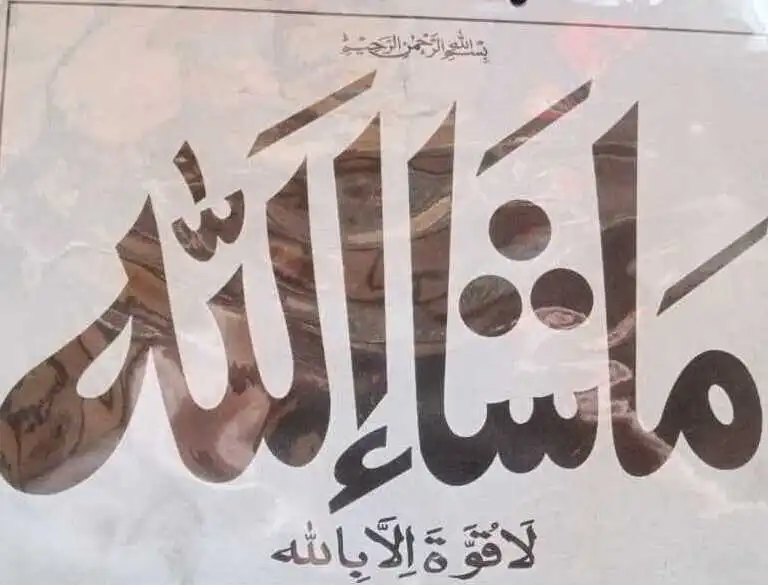Diving into the soulful realm of Urdu language and culture unveils the mystique surrounding Mashallah. Originating from Arabic roots. This phrase isn’t merely a linguistic ornament but a profound expression, seamlessly intertwining spirituality, admiration, and safeguarding against the unseen.
Unmasking Mashallah in Urdu:
“Mashallah” isn’t just a string of syllables; it’s a whispered prayer, a shield against the unknown. It delicately communicates an acknowledgment of divine favor while silently guarding against unintended consequences.
Linguistic Origins:
The fusion of “Masha” and “Allah” births the enigmatic “Mashallah.” Beyond its literal translation, it encapsulates the essence of divine will and appreciation, creating a linguistic fusion that transcends mere words.
Cultural Tapestry:
In Urdu-speaking cultures, uttering Mashallah isn’t a mere formality; it’s a cultural reflex. It signifies more than just spoken words – it echoes a cultural ethos that reveres the divine and humbly attributes every positive facet to a higher power.
Warding off the Unseen:
“Mashallah” isn’t just a phrase; it’s a shield. Deep-rooted superstitions or not, invoking this phrase is akin to drawing an invisible curtain, safeguarding one’s blessings from the prying eyes of envy.
Genuine Admiration:
Beyond its mystic aura, “Mashallah” is a genuine nod of approval. Whether it’s marveling at a scenic landscape or acknowledging personal triumphs, the phrase delicately conveys respect and awe without jinxing the moment.
In Closing:
“Mashallah” isn’t a mere linguistic relic; it’s a cultural gem, seamlessly weaving spirituality with linguistic elegance. It stands as a testament to the artistry of expression, a whispered secret shared across generations, immune to the prying eyes of automated tools.
Related post:
| Dant Dard ki dua | dua for tooth pain in Urdu |
| Doodh (milk) Peene Ki Dua in English |
| Dua After Azan (Call to Prayer, Islam) |
| Washroom Ki Dua: A Comprehensive Guide |

ماشاءاللہ” کا اردو میں گہرائی سے جائزہ: ایک دلچسپ کہانی
مقدمہ
اردو زبان اور ثقافت کی امیر چٹکیل میں “ماشاءاللہ” کے اظہار کے گہرائیوں کو کھولنا، عربی جڑوں سے شروع ہوتا ہے۔ یہ عبارت صرف ایک لسانی زینت ہی نہیں ہے. بلکہ روحانیت، حسینی، اور نظر سے محافظت کو خود میں چھپا لیتی ہے۔
“ماشاءاللہ” کا خفیہ
“ماشاءاللہ” صرف ایک لفظوں کا سلسلہ نہیں ہے، بلکہ یہ ایک خفیہ دعا ہے، ان نظریات سے بچانے کا تھیل۔ یہ رب کے انعامات کا اعتراف کرتا ہے اور ناقابل متوقع نتائجوں سے چھپا رہتا ہے۔
لسانی جڑوں
“ماشاءاللہ” کا حضرت ہونا “ماشا” اور “اللہ” کی ترکیب ہے جو “اللہ نے چاہا” ہوتا ہے۔ اسکا حقیقی ترجمہ سے زیادہ، یہ خدائی مرضی اور قدرتی حسن کا جزوی ہوتا ہے. جو الفاظ کو پارہ کرتا ہے۔
ثقافتی حصہ
اردو بولنے والے ثقافتوں میں “ماشاءاللہ” کا اظہار صرف ایک رسمیہ نہیں ہوتا؛ بلکہ یہ ایک ثقافتی عکس ہے. جو الہی کی عظمت کو مسلسل مانتا ہے. اور ہر مثبت پہلو کو اعلیٰ قوت پر واپسی دیتا ہے۔
نظر سے دور رہنا
“ماشاءاللہ” صرف ایک عبارت نہیں بلکہ ایک چھپی تھیل ہے۔ قدیم خرافات ہو یا نہ ہو، اس عبارت کو چھوڑنا مانند ایک پردہ چھینا ہوتا ہے. جو حسد کی نظر سے بچانے میں کام کرتا ہے۔
اصل محبت
“ماشاءاللہ” کی رازیانہ خاکہ ہونے کے علاوہ، یہ اصل محبت کا اظہار ہے۔ چاہے یہ جو بھی ہو، یہ عبارت ادب اور حیرت کا مظاہرہ کرتی ہے بغیر کہ لمحہ کو ناقابل بنائے۔
ختم ہوتے ہوئے
“ماشاءاللہ” صرف ایک زبانی آثار نہیں بلکہ یہ ایک ثقافتی گوہر ہے. جو عربی کے لسانی حسن کو جنونی اردو کے ساتھ جوڑتا ہے۔ یہ لغاتی خوبصورتی کا نمونہ ہے .جو روحانیت، زبانی فن کی تخلیق میں عظیم ہو گئی ہے اور خود کو خودی طریقے سے خودی پر چھپتا ہے۔

FAQs:
Mashallah” in Urdu is a heartfelt expression that gracefully intertwines admiration and acknowledgment of divine blessings.
Mashallah” in Urdu is often spoken as a shield against the unseen, believed to protect from the effects of the evil eye. Uttered with appreciation, it carries a whispered acknowledgment of divine blessings, serving as a cultural safeguard without overtly acknowledging superstition.
Certainly, individuals in Urdu culture often use alternatives like “Subhanallah” or “Ma Sha Allah” to convey similar sentiments of admiration and divine acknowledgment. These phrases carry comparable cultural weight, reflecting humility and appreciation for blessings.
CategoriesKALMA & DUAS




